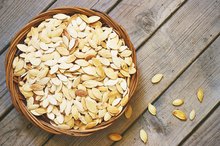Foods to Avoid If You Have Graves' Disease
Graves’ disease is the most common cause of hyperthyroidism in the United States, according to the National Endocrine and Metabolic Diseases Information Clearinghouse. Hyperthyroidism occurs when the thyroid – a butterfly-shaped gland in the neck – produces too much thyroid hormone. Graves’ disease causes symptoms including irritability, fatigue, muscle weakness, trouble sleeping, hand tremors, diarrhea, weight loss and goiter. If you suffer from Graves’ disease, avoiding some types of foods can help support proper thyroid function.
Soy
Food products derived from soybeans contain isoflavones, also known as phytoestrogens. Consuming these isoflavones, which include the compounds such as genistein and coumesterol, can stimulate the production of antibodies that act against the thyroid gland. Graves’ disease occurs when the body produces antibodies known as thyroid-stimulating immunoglobulin (TSI), which mimics the action of thyroid-stimulating hormone produced by the pituitary gland. The presence of TSI stimulates the thyroid gland to produce increased levels of thyroid hormone. In addition, the isoflavones in soy foods inhibit the ability of the enzyme thyroperoxidase (TPO) to extract the iodine needed to produce thyroid hormones. Although often associated with hypothyroidism, TPO inhibition can cause goiter, an inflammation of the thyroid gland, as described by research published by Diamanti-Kandarakis and associates in the Endocrine Society’s “Endorcrine Reviews.” By contributing to goiter, soy foods can therefore make the symptoms of Graves’ disease worse.
Brassica Vegetables
Thyroid Disease & Food to Stay Away From
Learn More
The class of vegetables known as brassica vegetables contain a compound called goitrogens. The brassica vegetables, also often referred to as cruciferous vegetables, include broccoli, Brussels sprouts, cabbage, cauliflower, collard greens, kale, kohlrabi, mustard, rutabaga, turnips, bok choy, Chinese cabbage, arugula, horse radish, radish, wasabi and watercress. Goitrogens can inhibit the uptake of iodine which the thyroid needs in order to produce thyroid hormones. Consuming large amounts of brassica vegetables can therefore cause hypothyroidism, a decrease in thyroid hormone. Because Graves’ disease causes an increase in thyroid hormone production, eating these vegetables would seem to help the disease. However, interference with the uptake of iodine results in goiter, which allows the thyroid to filter more blood to try to get more iodine, leading to the production of more thyroid hormone. Those with Graves’ disease should therefore avoid eating these vegetables that interfere with normal thyroid function.
Allergens
Because Graves’ disease is an autoimmune disease, avoid eating any foods that trigger an allergic reaction. Common allergy triggers include grain products, dairy products and nuts and seeds. Even mild reactions to a food allergen can increase the production of antibodies, some of which may be specific against the thyroid.
Related Articles
References
Writer Bio
Stephanie Chandler is a freelance writer whose master's degree in biomedical science and over 15 years experience in the scientific and pharmaceutical professions provide her with the knowledge to contribute to health topics. Chandler has been writing for corporations and small businesses since 1991. In addition to writing scientific papers and procedures, her articles are published on Overstock.com and other websites.









